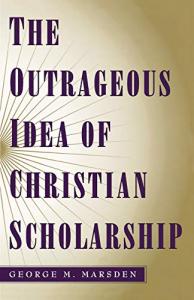What does it mean to be a Christian historian?

I’ve been one for almost a quarter-century, so I should know. But I don’t.
On a banal level, it means that one is a Christian and a historian. Check and check. But what does it mean to put my faith in Jesus Christ and my vocation as a Christian together?
When I started out on this journey, I thought I knew my mission. When I was figuring out where to attend graduate school, I read my future Ph.D. adviser George Marsden’s many books, including his The Outrageous Idea of Christian Scholarship. George taught me that Christian scholars could forthrightly disclose their religous faith. Moreover, although they should “accommodate their messages to the legitimate demands of a pluralistic setting,” Christian scholars should urge institutions to make space for explicitly Christian ideas, just as they make space for many other points of view.
As a young evangelical historian, I had a lot of grandiose ideas. I spent my years in graduate
school writing a history of Bill Bright and Campus Crusade for Christ. Perhaps I couldn’t help but be a bit infected by Bright’s “Come Help Change the World” message. It was easy to want to change academia. I could convert scores students (and a few colleagues) and wow fellow scholars and readers alike with my faith-informed scholarship.
I was always a bit fuzzy on the latter point. I figured my own Christianity gave me unusual insight into the ideas and actions of past Christians. Guided by Galatians 6:10 (“let us do good to all people, especially to those who belong to the family of believers”), I also thought that I had a particular
obligation to write about my fellow Christians with fairness and even a measure of sympathy. At the same time, my sense that all humans beings are sinners would help me avoid hagiography regardless of the subject matter. Beyond those basics, some of which were highly questionable, I really had no idea how to connect my faith to my scholarship.
I now much better understand my naïveté. Oh my goodness. Converts have been rare. I’m not exactly a bold witness for Jesus Christ on my campus. I do a fair bit of side-writing in which I articulate my faith, but I haven’t explicitly connected my faith to my scholarship in my recent major projects.
I should have this Christian historian thing figured out by now. After all, I’m surrounded by a
great cloud of witnesses. John Fea, Thomas Kidd, Kristin Du Mez, Beth Barr, Philip Jenkins, Chris Gehrz, Daniel Williams, Andrea Turpin, Agnes Howard, Tal Howard, Melissa Borja. And those are just the people I blog with!
In all seriousness, I learn so much from the way that my colleagues write about the past, no matter the subject. In his Why Study History?, John Fea asserts that “empathy and humility are a very good start for any kind of venture in historical thinking, writing, and teaching.” For me, that’s an essential starting point for any sort of historical scholarship. Any searching exploration of the past humbles us, because as we elucidate the insights and limitations of those who lived before us, we gain a better sense of our own limited vantage point and might realize that we have a similar collection of
blindspots. Chris Gehrz’s just published Charles Lindbergh is a splendid example of this combination of empathy and humility.
I also admire my colleagues who combine historical scholarship with what I hope I fairly categorize as faith-grounded activism. Here I think about Kristin Du Mez’s explication and evisceration of the evangelical cult of militant masculinity, and Beth Barr’s explication and evisceration of Christian patriarchy, as well as recent books by Jemar Tisby and Anthea Butler. These books call on evangelicals to repent and reform. They are powerful expressions of history and scholarship.
I don’t write with such fire. Sometimes I feel guilty about that! They are bold witnesses of another sort, and I’m not a very bold witness of any sort.
What about in the classroom? I teach in departments of Religious Studies and History at a state institution. That frees more than it constrains. If I wanted to do so, I could talk about my faith at great length in the clasroom. Some people might complain, but tenure is extremely reassuring. While I sometimes reference my own religious identity and beliefs, and while I answer student questions about them, I’m not a bold witness here either.
I am, however, far more aware of my identity as a Christian historian in the classroom. I spend
most of my time teaching courses about the history of Christianity, and I also teach about other religious traditions. I try very hard to nudge my students toward approaching all traditions with the same spirit of humility, empathy, and critique. And when it comes to Christianity, I remind them again and again that whatever they know about Christianity, it is always a small slice of the tradition’s geographical and chronological diversity.
I’d like to think that my faith informs the ways that I relate to my students, colleagues, and administrators. On my good days, it does! But I have non-Christian colleagues who exceed me in terms of selflessness, patience, and a host of other virtues. It’s easier to display knowledge than love.
My mid-career reckoning tells me that there is no single best way to be a Christian historian. It’s okay to be confused and broken. It’s okay to to fall short. It’s necessary to repent again and again.
I remain thrilled to be an employed historian. I know how lucky I am! I love digging into the lives of those who came before me, reading their letters, trying to figure out what made them tick and why they did the things they did. Writing for me is the best way for me to participate in God’s work of creation. And nothing is better than those moments when one hears that a student valued a course or appreciated some element of mentorship.
Such things are pretty outrageous.













